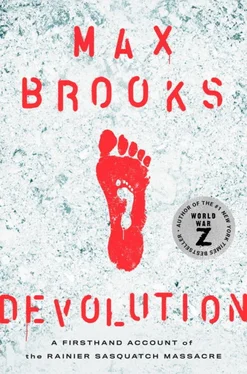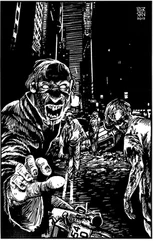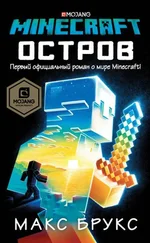Max Brooks
DEVOLUTION
A FIRSTHAND ACCOUNT OF THE RAINIER SASQUATCH MASSACRE
What an ugly beast the ape, and how like us.
—MARCUS TULLIUS CICERO
Introduction

BIGFOOT DESTROYS TOWN. That was the title of an article I received not long after the Mount Rainier eruption. I thought it was spam, the inevitable result of so much online research. At the time I was just finishing up what seemed like my hundredth op-ed on Rainier, analyzing every facet of what should have been a predictable, and preventable, calamity. Like the rest of the country, I needed facts, not sensationalism. Staying grounded had been the focus of so many op-eds, because of all Rainier’s human failures—political, economic, logistical—it was the psychological aspect, the hyperbole-fueled hysteria, that had ended up killing the most people. And here it was again, right on my laptop screen: BIGFOOT DESTROYS TOWN.
Just forget it, I told myself, the world’s not going to change overnight. Just breathe, delete, and move on.
And I almost did. Except for that one word.
“Bigfoot.”
The article, posted on an obscure, cryptozoological website, claimed that while the rest of the country was focused on Rainier’s wrath, a smaller but no less bloody disaster was occurring a few miles away in the isolated, high-end, high-tech eco-community of Greenloop. The article’s author, Frank McCray, described how the eruption not only cut Greenloop off from rescue, but also left it vulnerable to a troop of hungry, apelike creatures that were themselves fleeing the same catastrophe.
The details of the siege were recorded in the journal of Greenloop resident Kate Holland, the sister of Frank McCray.
“They never found her body,” McCray wrote to me in a follow-up email, “but if you can get her journal published, maybe someone will read it who might have seen her.”
When I asked why me, he responded, “Because I’ve been following your op-eds on Rainier. You don’t write anything you haven’t thoroughly researched first.” When I asked why he thought I’d have any interest in Bigfoot, he answered, “I read your Fangoria article.”
Clearly I wasn’t the only one who knew how to research a subject. Somehow, McCray had tracked down a decades-old list of my “Top Five Classic Bigfoot Movies” for the iconic horror magazine. In that piece, I’d talked about growing up “at the height of the Bigfoot frenzy,” challenging readers to watch these old movies “with the eyes of a six-year-old child, eyes that flick constantly from the terror on the screen to the dark, rustling trees outside the window.”
Reading that piece must have convinced McCray that some part of me wasn’t quite ready to leave my childhood obsession in the past. He must have also known that my adult skepticism would force me to thoroughly vet his story. Which I did. Before contacting McCray again, I discovered that there had been a highly publicized community known as Greenloop. There was an ample amount of press regarding its founding—and its founder, Tony Durant. Tony’s wife, Yvette, had also hosted several online yoga and meditation classes from the town’s Common House right up to the day of the eruption. But on that day, everything stopped.
That was not unusual for towns that lay in the path of Rainier’s boiling mudslides, but a quick check of the official FEMA map showed Greenloop had never been touched. And while devastated areas such as Orting and Puyallup had eventually reconnected their digital footprints, Greenloop remained a black hole. There were no press reports, no amateur recordings. Nothing. Even Google Earth, which has been so diligent in updating its satellite imagery of the area, still posts the original, pre-eruption photo of Greenloop and the surrounding area. As peculiar as all these red flags might be, what finally drove me back to McCray was the fact that the only mention of Greenloop after the disaster that I could find was in a local police report that said the official investigation was still “ongoing.”
“What do you know?” I asked him after several days of radio silence. That was when he sent me the link to an AirDrop link of a photo album taken by Senior Ranger Josephine Schell. Schell, who I would later interview for this project, had led the first search and rescue team into the charred wreckage of what had once been Greenloop. Amid the corpses and debris, she had discovered the journal of Kate Holland (née McCray) and had photographed each page before the original copy was removed.
At first, I still suspected a hoax. I’m old enough to remember the notorious “Hitler Diaries.” However, as I finished the last page, I couldn’t help but believe her story. I still do. Perhaps it’s the simplicity of her writing, the frustratingly credible ignorance of all things Sasquatch. Or perhaps it’s just my own irrational desire to exonerate the scared little boy I used to be. That’s why I’ve published Kate’s story, along with several news items and background interviews that I hope will provide some context for readers not familiar with Sasquatch lore. In the process of compiling that research, I struggled greatly with how much to include. There are literally dozens of scholars, hundreds of hunters, and thousands of recorded encounters. To wade through them all might have taken years, if not decades, and this story simply does not have that kind of time. That is why I have chosen to limit my interviews to the two people with direct, personal involvement in the case, and my literary references to Steve Morgan’s The Sasquatch Companion. Fellow Bigfoot enthusiasts will no doubt recognize Morgan’s Companion as the most comprehensive, up-to-date guidebook on the subject, combining historical accounts, recent eyewitness sightings, and scientific analysis from experts like Dr. Jeff Meldrum, Ian Redmond, Robert Morgan (no relation), and the late Dr. Grover Krantz.
Some readers may also question my decision to omit certain geographical details regarding the exact location of Greenloop. This was done to discourage tourists and looters from contaminating what is still an active crime scene. With the exception of these details, and the necessary spelling and grammatical corrections, the journal of Kate Holland remains intact. My only regret is not being able to interview Kate’s psychotherapist (who encouraged her to begin writing this diary) on the grounds of patient confidentiality. And yet this psychotherapist’s silence seems, at least to me, like an admission of hope. After all, why would a doctor worry about the confidentiality of her patient if she didn’t believe that patient was still alive?
At the time of this writing, Kate has been missing for thirteen months. If nothing changes, this book’s publication date may see her disappearance lasting several years.
At present, I have no physical evidence to validate the story you are about to read. Maybe I’ve been duped by Frank McCray, or maybe we’ve both been duped by Josephine Schell. I will let you, the reader, judge for yourself if the following pages seem reasonably plausible, and like me, if they reawaken a terror long buried under the bed of youth.
Читать дальше








![Traudl Junge - Hitler's Last Secretary - A Firsthand Account of Life with Hitler [aka Until the Final Hour]](/books/416681/traudl-junge-hitler-s-last-secretary-a-firsthand-thumb.webp)






